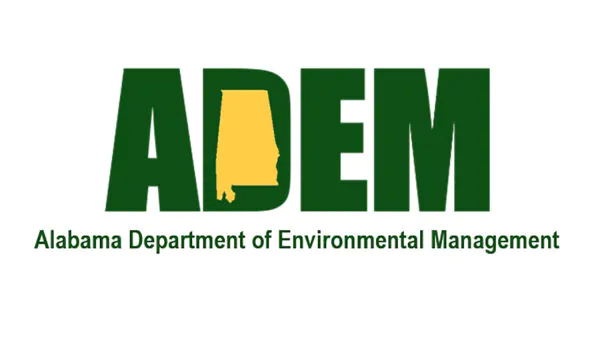The Alabama Department of Environmental Management and the Alabama Department of Public Health issued a joint statement today urging businesses that are reopening after the easing of coronavirus restrictions to thoroughly flush and inspect their water and air conditioning systems to avoid creating other potentially deadly health hazards – Legionnaires’disease and other bacterial infections.
Legionnaires’ disease is a serious, sometimes fatal type of lung infection, or pneumonia, caused by Legionella bacteria. According to the U.S. Centers for Disease Control and Prevention, people can get sick when they breathe in mist or accidentally swallow water containing Legionella. The bacteria grow in warm water and can be found in showerheads and faucets, hot tubs, cooling towers, hot water tanks, decorative fountains or plumbing systems in large buildings.
The CDC says more than 6,000 cases of Legionnaires’ disease are reported in the U.S. each year, and that one in 10 people who get sick from the infection will die. It is generally not contagious from person-to-person.
On Tuesday, Gov. Kay Ivey issued a “Safer at Home” order that will allow some businesses, including retail stores, to reopen beginning today, April 30. Those businesses must adhere to social-distancing and sanitation rules. Other nonessential businesses such as dine-in restaurant service, barber shops and hair salons must still remain closed at least for now in the continuing effort to curtail the spread of COVID-19.
“We have a lot of businesses that are preparing to reopen this week,” ADEM Director Lance LeFleur said. “This is certainly good for those businesses and the state’s economy. As they reopen, however, we strongly encourage them to take extra care to make sure they do soin an environmentally safe manner. We ask that they pay particular attention to their water and air-handling systems, which if contaminated with certain bacteria can lead to harmful health effects, not the least of which is Legionnaires’ disease.
“We want the environment in which Alabamians work and recreate, whether outdoors or inside, to be as safe as possible.”
Dr. Karen Landers, District Medical Officer for the Alabama Department of Public Health, said the public can’t afford to ignore other potential health threats during the coronavirus crisis.
“While much attention continues to be focused on COVID-19 in Alabama, promotion and protection of the public’s health include prevention of other diseases as well,” Dr. Landers said. “The Alabama Department of Public Health reminds the public that information related to building maintenance, such as standing water, which may have occurred during prolonged closure, can have health implications. Illnesses such as Legionella can occur when water stands at certain temperatures and the disinfectant measures such as chlorination can be decreased.
“ADPH joins with ADEM in recommending that businesses follow current guidance from CDC to reduce the risk of waterborne illness as operations resume.”
Legionnaires’ disease first made headlines in the U.S. in 1976, when attendees at an American Legion convention in Philadelphia fell ill to the not-well-known form of pneumonia, and public health officials scrambled to find the cause of the disease outbreak. They eventually determined the illness was caused by bacteria that had been breeding in the cooling tower of the hotel’s air-conditioning system and spread throughout the hotel. It sickened 221 people, of which 34 died.
Lynn Battle, chief of the Office of External Affairs at ADEM, pointed out that the Legionella bacteria occur naturally in freshwater environments, and can grow and spread in man-made water systems. Symptoms of the disease can appear within a few hours to three days after exposure and include cough, shortness of breath, fever, muscle aches and headaches.
“A recent notable case in the Southeast occurred in the summer of 2019,” she said. “Twelve confirmed cases of the Legionnaires’ disease, including one death, and 61 other probable cases were identified among guests who attended a convention at a hotel in downtown Atlanta.”
Battle said information for reopening businesses with steps to take to make sure their water and air-handling systems are safe after a prolonged closure are available on the CDC’s website at https://www.cdc.gov/coronavirus/2019-ncov/php/building-water-system.html. The recently issued guidelines include eight recommended steps, and covers flushing and maintaining water systems, cleaning water fixtures, and cleaning and maintaining water towers, water heaters, tubs/spas, showers and fire sprinkler systems.
Battle said flushing water lines would also help remove any trace amounts of lead, which could have accumulated when the water system wasn’t in use.
For more information about ADEM, go online to www.adem.alabama.gov. Information from the Alabama Department of Public Health is available at www.alabamapublichealth.gov.


















































